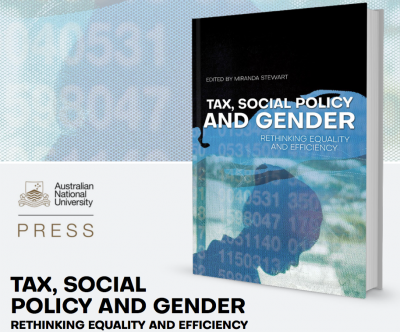The recently released book Tax, Social Policy and Gender, edited by Miranda Stewart (ANU e-press) confronts the entrenched gender inequities in our current tax and social security system. A multi-disciplinary team of authors cover the gender gap in work, care, education, employment and retirement in Australia. The final chapter, ‘Towards Gender Equality in the Tax-Transfer System’, which I co-authored with Miranda Stewart, deals with three main issues: gender budgeting and impact analysis; a tax and transfer reform agenda for gender equality; and ten points on the importance of the policy process.
Australia once led the world in gender budgeting and gender impact analysis

Australia once led the world in gender budgeting and gender impact analysis. The first women’s budget statement was introduced in 1984, but there has not been once since 2014. Unfortunately now, according to the OECD, Australia ranks equal last in relation to gender impact analysis.
…. now, according to the OECD, Australia ranks equal last in relation to gender impact analysis.
In a nutshell, we provide four main reform areas in pursuit of gender equality and women’s economic empowerment. Ensuring a progressive income tax is both an efficient and equitable tool for achieving gender equality. We advocate that, as far as possible, the individual is best placed to be the unit for tax and transfer policies, rather than the family or the household, because we can’t always assume that family or household members share their income. In addition, to treat a husband and wife as a unit can lead, as the chapter indicates, to work as a disincentive for women.
We are also of the view that reform is needed in the way Australia currently funds care and care giving. To that end, we want to see a fairer share of the fiscal cost and time of care between men and women.
The final reform area canvassed in the book’s last chapter is security in retirement, including reform of the superannuation system. A system that links security in retirement solely to waged income, or dependence on a partner in old age, is obviously detrimental to gender equality.

A strategic and tactical approach to the policy process is critical to gaining policy success on gender equality.
A strategic and tactical approach to the policy process is critical to gaining policy success on gender equality. The chapter ends with ten reflections on the policy process: considering the economic and political context; clarifying and articulating for wide acceptance of the nature of the problem; the power of data and evidence; the value of international comparisons; the importance of dialogue between policy makers and researchers, as well as those who deliver services, and broader civil society; the power of networks and relationships; strategic use of cross-sector collaborations; the need for political pragmatism; the danger of going backwards; and starting with institutions that can assist in filling the data gaps on gender inequality.
… renew Australia’s commitment to best practice with respect to gender impact analysis.
Finally, we conclude with a call to renew Australia’s commitment to best practice with respect to gender impact analysis. And we are of the firm view that such analysis must come early in the policy process, rather than after the fact.




